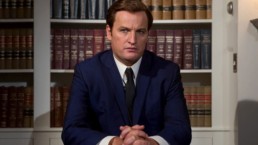‘Chappaquiddick’ Review: History Chooses Who is Remembered, Whose Story Will Be Told
Nothing will stop the Kennedy machine from destroying everything in its path in the name of power.
Friday, July 18, 1969. Not a date that many young movie viewers may find significant, but director John Curran’s Chappaquiddick teaches us about that deadly night, which includes a tragic cover-up and criminal negligence.
Chappaquiddick is the story of how high political power makes a man indestructible. Massachusetts’ Senator Ted Kennedy (Jason Clarke) and aspiring political strategist Mary Jo Kopechne (Kate Mara) get into a vehicular accident when Kennedy steers off Dike Bridge in Chappaquiddick, Massachusetts around 12:30 am. While Ted survives the crash, Mary Jo does not. She is found 10 hours later inside the flipped car at the bottom of Poucha Pond. 10 hours – you may say – what was Kennedy doing all that time? Why didn’t he call the police right away? What kind of legal troubles did he get into? Most importantly: Why haven’t I heard of this? All these questions swirled in my head as I watched this heartbreaking docudrama, and was reminded that the trend of protecting our political heads of state over serving justice is far too ingrained in our nation.
Taylor Allen and Andrew Logan wrote a screenplay showing the ugly underbelly of politics and power in America. Due to a majority of the nation’s unrest with our current administration, I was deeply distressed to see that almost everyone in Ted’s life was spinning the tragedy so that he could still run for president in the future.
Chappaquiddick is another reminder of how manipulative politics are. When Ted calls Joe Kennedy (Bruce Dern) to tell him “he’s made a mistake,” Joe, exclaims “Alibi!” (his only spoken line) to his gathering a team at the Kennedy compound. It’s now their job to cover up and create a narrative that would keep the ‘Kennedy’ name synonymous with a wholesome, classic American family. The team of 10 men works hard to control what the nation knows, with little regard to the deceased’s family. Lawyer Ted Sorensen (Taylor Nichols) creates the narrative that Mary Jo was driving so that this incident can be quickly swept under the rug. In an extremely brief moment of good conscience, Kennedy does not use this lie, however, he is not the hero that I hoped he would become as he still falls into the alluring but false sense of “safety” his team creates.
Nothing will stop the Kennedy machine from destroying everything in its path in the name of power.
The singular voice of reason during the days after the accident is Ted’s cousin, Joe Gargan (Ed Helms), who continues to urge Ted to follow his compass and stay with the truth rather than continue to fabricate a story. He tries to be the Jiminy Cricket to Ted’s lost and broken Pinocchio, but continues to fail as the manipulative and tightly gripped hand of Joe Kennedy continues to pull the strings. Back at the Kennedy compound, while the team is working to change the negative headlines, Gargan bitingly says, “A girl dies and Ted is a martyr?” His frustration and disgust at the easily crafted deception of Ted Kennedy as the victim highlight the theme of justice coming second to maintaining political power.
Towards the end of the movie, Kennedy asks Gargan to write a resignation letter after stating that he can no longer support Kennedy. On the night of his televised appeal to the American public, Gargan enters the room believing that his cousin is going to, finally, do the right thing. Kennedy tells Gargan that he cannot give up this opportunity and doesn’t know what is right anymore. Dumbfounded, Gargan replies with, “This isn’t about opportunity, it’s about integrity.” This is when the final, fragile connection between these two men become extinct. Nothing will stop the Kennedy machine from destroying everything in its path in the name of power.
The cast is exceptional in their portrayals of these real and flawed people. Clarke’s Ted Kennedy shows us a man who is struggling with the constant pressure of living in his brother’s shadow while wanting to create a name and legacy for himself. Helms masters the complicated and conflicted relationship that Gargan had with Kennedy during this time. Kate Mara’s Mary Jo perfectly paints the struggle between moving forward after the devastation of Robert Kennedy’s assassination and remaining part of the Kennedy family because of the connection she had during Bobby’s election campaign. Although not given much screen time, she illustrates how history chooses who is remembered, whose story will be told, and who becomes an afterthought.
In today’s world, we continue to see this struggle between political power and justice. Like the men portrayed in Chappaquiddick, we see so many lie, deny, and create the narrative given to the public to survive and gain, or maintain, the ultimate power that politics gives. This movie serves as a reminder that we cannot let those who were given power run wildly with it. It asks us to take a hard look at those who we have elected and evaluate if they are working for opportunity or with integrity, just as Gargan says to Kennedy. Lawyer Ted Sorensen perfectly sums it up when he says, “History usually has the final word on those things.” Chappaquiddick gives us the opportunity to look at this event again and decide how we want to remember it, giving us permission to use this refined critical lens as we write the history that future generations will learn.
101 minutes. ‘Chappaquiddick’ is rated PG-13. Opens Friday, April 6th at Arclight Hollywood with early screenings on Thursday, April 5th at The Landmark, AMC Marina, and AMC Century City.
Ashley DeFrancesco
Ashley has been fascinated with films since a young age. She would reenact her favorite scenes for her family, friends, and adoring fans (stuffed animals).

